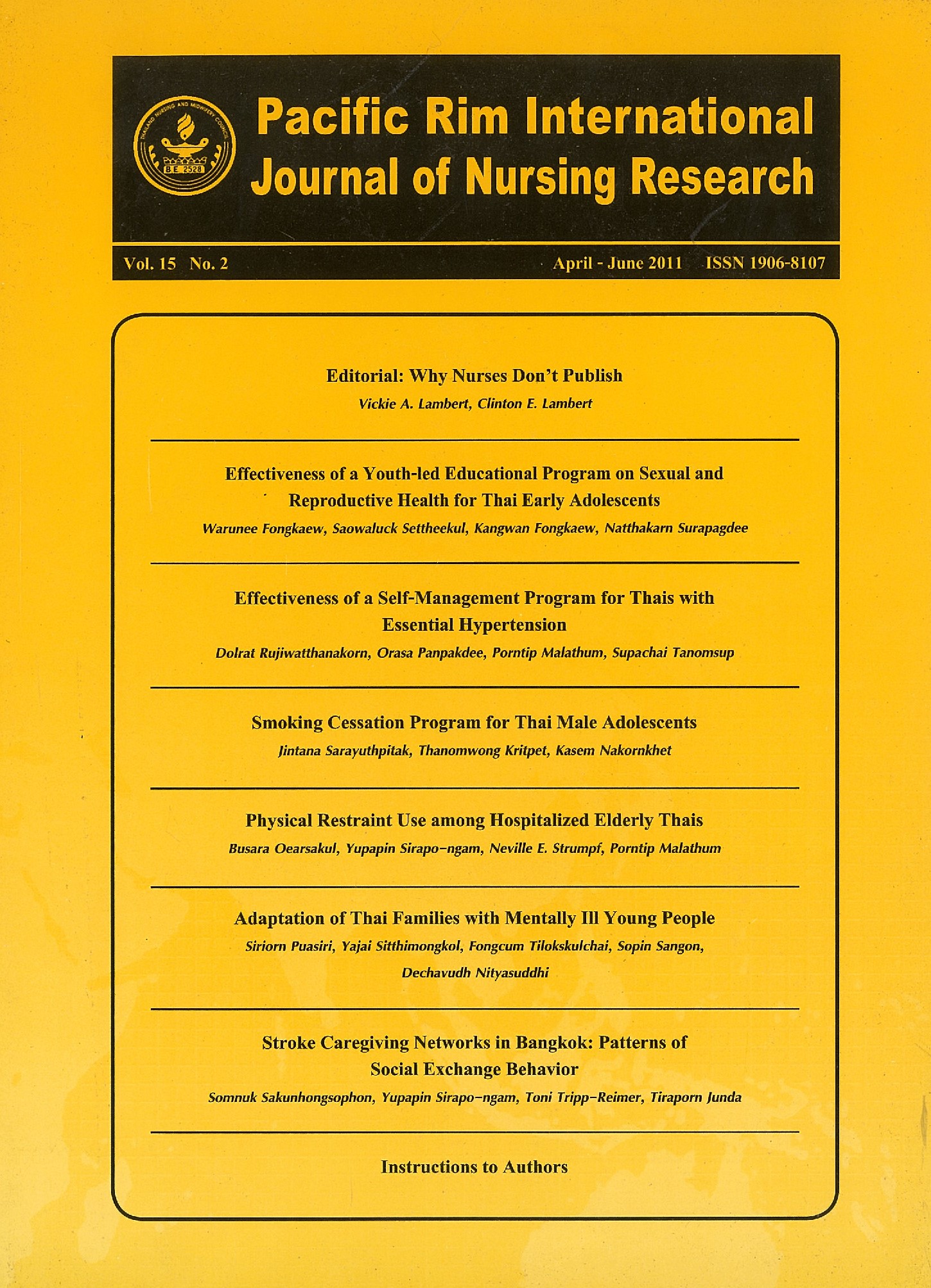Effectiveness of a Self-Management Program for Thais with Essential Hypertension
Keywords:
การควบคุมความดันโลหิต, ความดันโลหิตสูง, ความสามารถในการดูแลตนเอง, โปรแกรมการจัดการตนเอง, Blood pressure control, Hypertension, Self-care ability, Self-management programAbstract
บทคัดย่อ
การศึกษานี้มีวัตถุประสงค์เพื่อศึกษาประสิทธิภาพของโปรแกรมการจัดการตนเองต่อความรู้เรื่องความจำเป็นในการดูแลตนเองความสามารถในการดูแลตนเอง และการควบคุมความดันโลหิตในผู้เป็นความดันโลหิตสูงชนิดไม่ทราบสาเหตุที่ควบคุมโรคไม่ได้ กลุ่มตัวอย่างซึ่งคัดเลือกแบบเจาะจงคุณสมบัติจำนวน 96 ราย จากโรงพยาบาลชุมชนหนึ่งแห่งในประเทศไทย ถูกสุ่มเข้ากลุ่มทดลอง 50 คน หรือกลุ่มควบคุม 46 คน ด้วยวิธีสุ่มแบบง่าย กลุ่มทดลองได้รับโปรแกรมการจัดการตนเอง 10 สัปดาห์และการดูแลตามปกติ ในขณะที่กลุ่มควบคุมได้รับการดูแลตามปกติเท่านั้น โปรแกรมการจัดการตนเองประกอบด้วยการเข้าร่วมกลุ่มเรียนรู้แบบกลุ่มย่อย 3 ครั้ง เพื่อปรับกระบวนการคิด เพิ่มความรู้เรื่องความดันโลหิตสูงและความสามารถในการดูแลตนเอง เก็บรวมรวมข้อมูลโดยวิธีการสัมภาษณ์ตามแบบสอบถามและการวัดความดันโลหิตก่อนและ 4 สัปดาห์หลังสิ้นสุดโปรแกรม การวิเคราะห์ข้อมูลใช้ Mann-Whitney U test และ independent t-test ผลการศึกษาพบว่า 4 สัปดาห์หลังสิ้นสุดโปรแกรม กลุ่มทดลองมีค่าเฉลี่ยอันดับของความรู้เรื่องความจำเป็นในการดูแลตนเองและความสามารถในการดูแลตนเองด้านการกินยา การควบคุมอาหาร การออกกำลังกาย และการประเมินตนเองสูงกว่ากลุ่มควบคุม และมีค่าเฉลี่ยความดันโลหิตซิสโตลิคและไดแอสโตลิตต่ำกว่ากลุ่มควบคุม ผลการศึกษานี้แสดงว่าโปรแกรมการจัดการตนเองสำหรับผู้เป็นความดันโลหิตสูง มีประสิทธิภาพต่อการเพิ่มความรู้เรื่องความจำเป็นในการดูแลตนเองความสามารถในการดูแลตนเอง และการควบคุมความดันโลหิต
คำสำคัญ : การควบคุมความดันโลหิต, ความดันโลหิตสูง, ความสามารถในการดูแลตนเอง, โปรแกรมการจัดการตนเอง
Abstract
This randomized controlled trial study aimed to examine the effectiveness of a self-care management program for Thais with essential hypertension. The program was based on self-care demands, self-care ability and blood pressure control. The study involved 96 purposively selected, Thais with hypertension who received care at a community hospital in Thailand. Subjects were randomly assigned to either the experimental (n = 50) or control group (n = 46). Those in the experimental group received a 10-week self-management program, plus routine care, while those in the control group received only routine care. The self-management program consisted of three small group education sessions, wherein cognitive restructuring was used to increase the subjects’ knowledge about, and ability to carry out, self-care for hypertension.
Data were collected via interview-administered questionnaires and blood pressure measurements, before and after participation in the program. Data were analyzed via use of the: descriptive statistics; Chi-square; Mann-Whitney U test; and, independent t-test. Results indicated the experimental group, four weeks after completion of the program, had a significantly higher mean rank of knowledge of self-care demands and self-care ability regarding medication-taking, dietary control, exercise and self-monitoring, as well as significantly lower mean systolic and diastolic blood pressures, than the control group. Findings suggest the program was effective in enhancing subjects’ knowledge regarding hypertension, as well as self-management and control of their blood pressure.
Keywords : Blood pressure control, Hypertension, Self-care ability, Self-management program
Downloads
How to Cite
Issue
Section
License
Copyright: The Pacific Rim International Journal of Nursing Research, Thailand Nursing & Midwifery Council has exclusive rights to publish, reproduce and distribute the manuscript and all contents therein.







.png)


